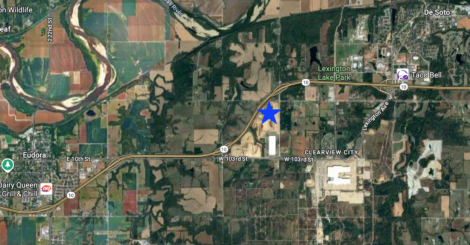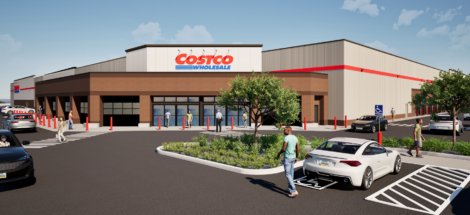
A big data center may be Douglas County’s newest neighbor; plans call for $700M center along K-10
Project would be in Johnson County but a few miles from Eudora

photo by: Google maps/LJWorld
The blue star shows the proposed location for a large data center along Kansas Highway 10.
UPDATED 9 P.M. AUG. 21
Douglas County’s newest next-door neighbor may soon be a big, energy-hungry, water-thirsty data center that provides the computer power for artificial intelligence and other emerging technologies.
The city council in nearby De Soto on Thursday evening took the first steps to allow an out-of-state development company to build — initially — $700 million worth of data centers on vacant property just east of the Douglas County-Johnson County line along Kansas Highway 10.
The project is proposed for the Flint Commerce Center, which is about three miles east of Eudora at the southeast corner of the K-10 and Evening Star Road intersection. That puts it a few blocks west of the $4 billion Panasonic electric vehicle battery plant that recently opened. Motorists along K-10 would recognize the Flint center as the area where a very large warehouse building was built during the last couple of years. The data center project eventually would occupy the remaining vacant land in that development.
The property, however, is within the city limits of De Soto, which has made large-scale annexations in recent years as it became evident that the Panasonic battery plant would spur more development in the area.
Given that annexation and the location of the county line, neither Eudora nor Douglas County will play any role in the approval process for the data center project. The project likely will bring more construction workers into the area for an extended period of time. The data centers, however, are not likely to produce a lot of employees once they begin operations. That’s according to the materials included in the De Soto City Council’s agenda packet, which state: “Following completion of construction, employee headcount at the Project will be fairly low, therefore, added traffic to and around the Project will be minimal when contrasted with the significant additional revenue to be received by the city from the Project.”
Thus, the project may not greatly impact Douglas County residents directly, as the project won’t be receiving any financial incentives from any Douglas County government, and isn’t likely to produce a surge in demand for housing or create traffic snarls.
But big data center projects have been controversial in other communities due to the strain they put on utility infrastructure, such as electricity grids and water and sewer systems. Some also use massive batteries to store electricity that is used in their operations, which have created haz-mat and other types of concerns among some neighbors.
But they also can provide a big boost to the finances of local governments. De Soto city officials clearly see the potential for the data projects to provide significant new revenues to local governments.
The large amount of electricity the project would use would be one way the City of De Soto coffers would benefit directly. According to a city memo, De Soto expects to receive $1.5 million per year in electric franchise fees — a type of sales tax charged on electric bills — as each phase of the data center is developed. When fully developed, the city expects to receive $5.5 million per year in electric franchise fees.
So it will be interesting to watch how a close neighbor processes a project like this.
The closest Douglas County neighbor to the project is Eudora, a town of about 6,000 near the eastern border of Douglas County. Eudora Mayor Tim Reazin told me he hasn’t yet seen obvious impacts the project will have directly on Eudora, due to the limited number of employees the center likely will produce.
The city, however, is highly interested in what does ultimately develop at the Flint Commerce Center because it is just three miles from the center of Eudora. There has been much discussion that the center will be a hub for warehouses, which could produce significant amounts of truck traffic through Eudora. From that standpoint, data center development at Flint may produce fewer impacts than warehousing, Reazin said. Reazin has advocated that the state of Kansas needs to extend road improvements planned for K-10 and the surrounding area all the way to Eudora to help ensure future development in western Johnson County doesn’t have a negative traffic impact to Eudora.
“I don’t think this use will affect us much,” Reazin said of the data center. “It is the rest of the how many hundreds of acres that are there for Flint development and the potential for other warehousing that would bring more semi truck traffic. Those are the things that affect us.”
When trying to determine the impacts of the project, however, there is a big question outstanding: How big is this project ultimately going to be?
The developer has promised to build $700 million of data centers during the next seven years in order to qualify for all of the financial incentives that De Soto would provide. However, the more eye-popping number is $50 billion.
As part of its meeting Thursday, the De Soto City Council approved a resolution of intent to issue up to $50 billion worth of industrial revenue bonds for the project. A key benefit of those industrial revenue bonds is that the project would not be required to pay sales taxes on any construction materials or equipment for the project. That equipment provision means the project wouldn’t have to pay sales taxes when purchasing any of the computer servers that would fill the data center.
Obviously there is a huge difference between $700 million and $50 billion. As near as I can tell, however, the documents in the City Council’s agenda packet don’t explain why the City of De Soto would be asked to issue industrial revenue bonds in an amount so much larger than what is initially anticipated for the project.
The publicly-available information about the project does leave many question about the development. A few that I’ve noticed by briefly going over the materials include:
• How large, physically, will these data center buildings be? The developer submitted a concept plan for the development, which likely would show the size of the buildings. However, that concept plan was not included as part of the cache of documents included in the city council’s agenda. At Thursday’s meeting, however, a concept site plan was shown to the council members. That plan showed four new buildings and new electrical substation on the vacant land. The data centers would occupy all the vacant land in the Flint center, essentially changing the development from a planned warehouse district to largely a data center development.
The concept plan, however, didn’t provide details about how large the buildings would be. Ultimately that will be important because the size of the buildings are key to figuring out how much money the City of De Soto may get from this project. As contemplated, the project would receive a 100% multi-year property tax abatement, but would make a payment in lieu of taxes instead. As structured, the payment in lieu of taxes is based on the size of the buildings — ranging from about 40 cents per square foot to 50 cents per square foot, depending on the year.
• Large sections of several documents in the council’s agenda packet are redacted. Those redacted sections include information about the water and sewer requirements for the project and the dollar amounts that the developer is proposing to pay for those improvements. Also redacted are the expected chemical and biological elements sewage from the data center is expected to include. Data centers often need large amounts of water — and thus produce large amounts of wastewater — because they use the water to help cool the computer servers that generate high levels of heat.
• Information about the proposed developer is limited in the agenda packet. The documents list Mount Sunflower Properties LLC as the developer of the project, but additional information about what other projects it has undertaken or what other large entities it is connected to, weren’t part of the public documents. According to documents with the Kansas Secretary of State’s office, Mount Sunflower Properties is a newly formed entity, so an annual report that would list more detailed information about its ownership hasn’t yet been filed. At Thursday’s meeting, however, it became clear that Beale Infrastructure, a U.S.-based company that has developed data centers across the country is leading the project. A representative for that company also told city council members that the end users of the data centers will be some of the largest, most recognizable tech companies in the world.







